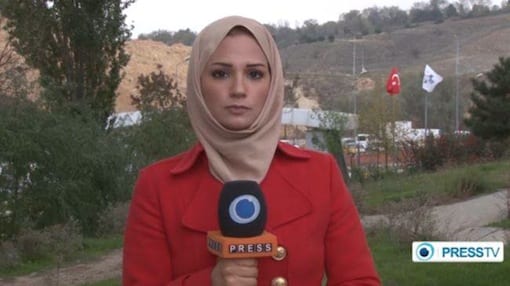Death of a True Reporter
Serena Shim, 1984-2014
VIJAY PRASHAD
[dropcap]M[/dropcap]y twitter feed has become a memorial for the death of journalists from Iraq to Turkey. The latest tragedy was the death of Serena Shim, a US citizen who was of Lebanese origin and worked for Press TV. Last year I had met Serena in Beirut. It is commonplace for journalists to meet each other, to learn where one has been and whether there are stories out there that help give wider context and confirmation for stories that one follows. It was in that context that I met Serena, who had been covering the conflict in Ukraine, Iraq and of course Lebanon. She was a warm person, very smart and very well informed. Her bravery impressed me. Others of her ilk and of her age bracket include the fabulous Radwan Mortada (al-Akhbar) and Jenan Moussa (al-Ain). These are reporters who go into dangerous situations with no “security advisors” – I worry for them daily.
Ten days ago, Serena’s employer Press TV sent her to Turkey to cover the story of the Kobane conflict and to look into the allegations of Turkish help to the Islamic State. This is a story that takes one to Urfa, a city that is linked to Syria through the border crossing at Akçakale. At Urfa’s Balıklıgöl State Hospital, evidence for the treatment of Islamic State fighters is not camouflaged – it is there in plain sight. The Islamic State wounded from the battle of Kobane cross over for treatment here. Any journalist who covered this aspect of the war knows that Turkish intelligence (Milli İstihbarat Teşkilatı) has been mighty skittish about the story. They are quick to show up, and quick to make gestures of ill will.
On Friday, October 17, Serena went on air for Press TV. She was rattled in the broadcast. Serena said that Turkish intelligence officials had accused her of spying. She had reported that Islamic State fighters had been smuggled over the border in trucks with logos from the World Food Organization. No one had seen this before or made such allegations. It came to the heart of the suspicion of various forms of assistance being provided to the Islamic State through Turkey. Barzan Iso, a Syrian Kurdish journalist, had already reported that Qatari charities have been using the Jarabulus crossing to get aid to the Islamic State. I had also reported on this but did not have any evidence that trucks with logos from international organizations were being used for this purpose.
From the Turkish towns of Mardin, Kilis and Urfa, the foreign jihadis made an easy transit into Syria. Until recently, Turkish authorities did not try to hide this “rat line.” Oğuzeli Airport in Gaziantep (Turkey) had come to resemble the old airport in Peshawar (Pakistan), as the bearded wonders disembarked with a glint in their eyes to join what they saw as a holy war. Pakistani intelligence had the same steel in their walk as Turkish intelligence – the parallels seemed to me more and more appropriate when a Kurdish commander told me that the Islamic State is to Turkey as the Taliban is to Pakistan.
In her last broadcast via Skype, Serena told Press TV that she had footage of the IS militants making across the border in broad daylight. The pressure from Turkish intelligence worried her. Reporters Without Borders had called Turkey the “largest prison for journalists.” Because of that she said, “I’m a little bit frightened.” She felt that the pressure had come for her forthright reports from Turkey about the war in Syria.
Two days later, on Sunday, Serena was traveling in a rental car from the border to the town of Suruç, when her car collided with a “heavy vehicle,” likely a cement mixer. The driver and truck vanished. Serena was killed. Her cameraman was injured and is now at Suruç State Hospital.
Turkish authorities say that the driver of the cement mixer has been arrested. An investigation is ongoing.
Serena’s name joins a long list of journalists killed in the war in Iraq-Syria – the Islamic State murdered Mohanad al-Akidi and Raad Mohamed al-Azzawi this month. This was in Iraq.
The Kobane fight has raised tensions in Turkey. It has threatened the “Imrali Process,” a peace negotiation between the Turkish government and the Kurdish Worker’s Party (PKK). Protests inside Turkey for action to defend Kobane resulted in the death of at least thirty people. Pressure has also come on the pro-Kurdish media. On October 2, demonstrators in the town of Diyarbakir attacked four reporters for the pro-Kurdish press – Bisar Durgut and Nihat Kutlu of the daily Azadiya Welat and Beritan Canözer and Sarya Gözüglu of JINHA. Bisar Durgut had eight stab wounds. On 14 October, in Turkey’s Adana, Kadri Bagdu was shot dead by two men on a motorcycle as he distributed the Kurdish daily papers Azadiya Welat and Ozgur Gundem.
Serena Shim, who leaves behind a family that includes her two young children, found herself chasing the truth in a highly charged situation. Evidence that Turkey is assisting the Islamic State is awkward for Ankara. It is as awkward as the evidence of collusion between al-Qaeda and the Pakistani Navy uncovered by my friend and Asia Times colleague Saleem Shahzad (1970-2011). He was killed for his fearless journalism. It is my feeling that Serena met Saleem’s fate.
Vijay Prashad is the author of No Free Left: The Futures of Indian Communism (forthcoming from LeftWord Books, New Delhi). He is a contributor to Killing Trayvons: an Anthology of American Violence.
NOTICE: YOUR SUBSCRIPTIONS (SIGNUPS TO OUR PERIODICAL BULLETIN) ARE COMPLETELY FREE, ALWAYS. AND WE DO NOT SELL OR RENT OUR EMAIL ADDRESS DATABASES.
